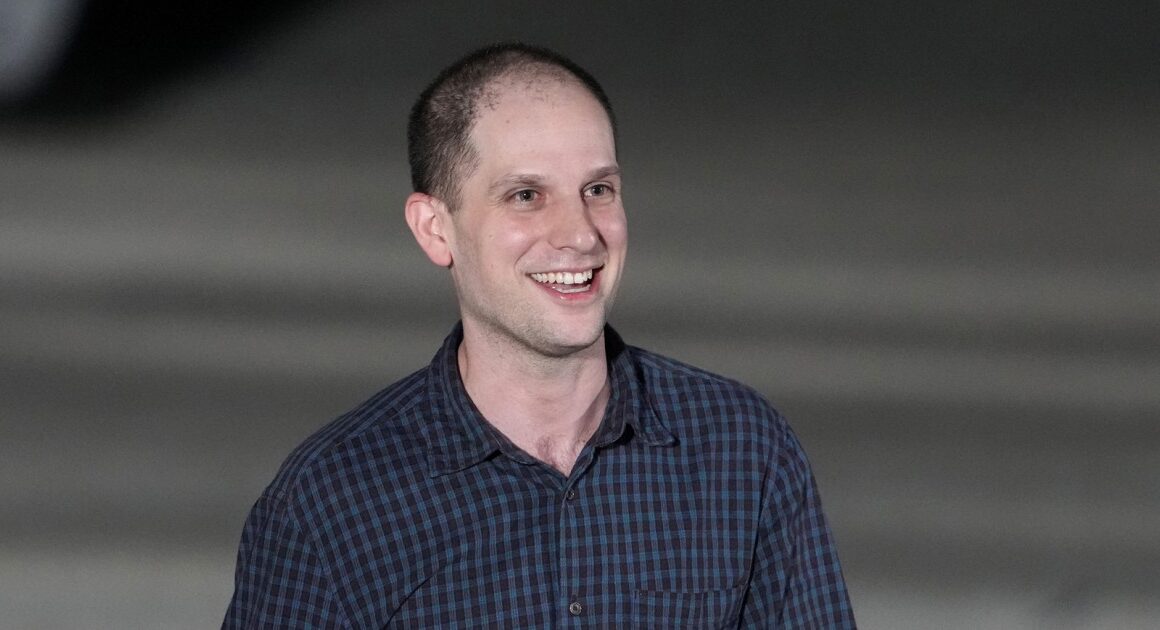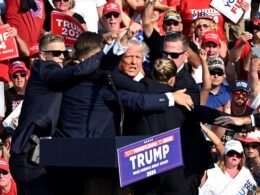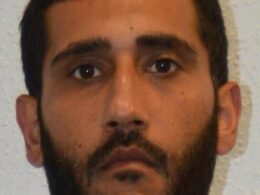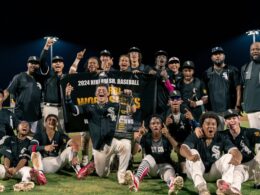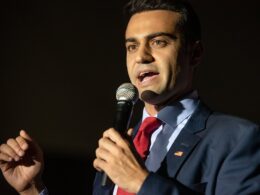Wall Street Journal reporter Evan Gershkovich advocated for dissidents languishing in Russian prisons in his first public comments on U.S. soil after he was freed Thursday in a prisoner exchange.
“There’s one thing I would like to say. It was great to get on that bus today and see not just Americans and Germans but Russian political prisoners,” Gershkovich said in a brief conversation with Andrew Roth, a reporter for The Guardian, as he stepped off the plane at Joint Base Andrews in Maryland.
“I just spent a month in prison in Yekaterinburg where basically everyone I sat with was a political prisoner,” he added.
Seven Russian citizens, including four who worked with the late opposition figure Alexe i Navalny, were among the 24 people freed in the major multinational prisoner exchange. They were jailed in their own country and released into the West.
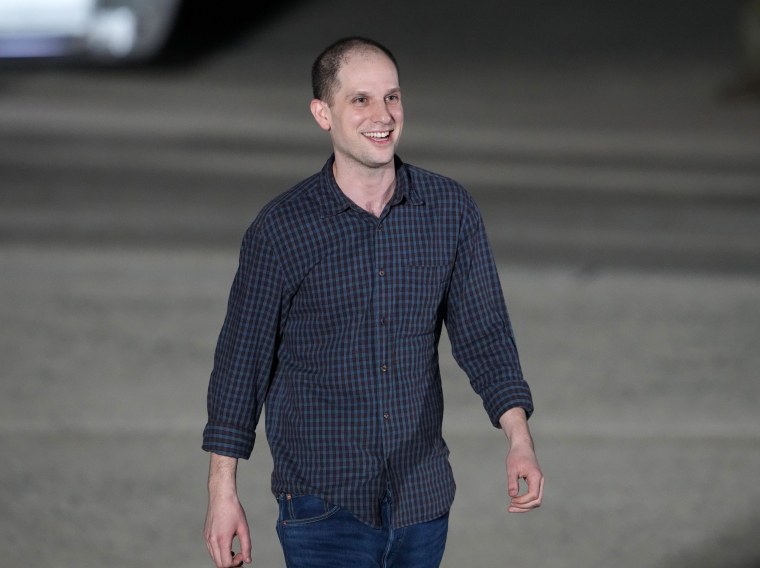
On the dissidents he met behind bars, Gershkovich said that no one knew them publicly but that they had various political beliefs. “They’re not all Navalny supporters,” he added.
“Today was a really touching moment … but it would be good to see if we could potentially do something about them as well,” he said.
President Joe Biden called the deal a “feat of diplomacy and friendship.” It was cut among seven nations, involving 24 people, including five Germans and seven Russian citizens held in Russia, and eight Russians imprisoned in the U.S., Germany, Slovenia, Norway and Poland.
The exchange took place in Turkey, and a plane carrying Gershkovich, Marine veteran Paul Whelan, reporter Alsu Kurmasheva and Vladimir Kara-Murza, a Pulitzer Prize-winning Russian dissident, touched down in Maryland at 11:38 p.m.
Kara-Murza is a dual Russian British national and U.S. permanent resident who was jailed on treason charges for 25 years in April 2023. Biden noted that Kara-Murza was a pallbearer during the funeral of Sen. John McCain, R-Ariz.
Kurmasheva is a dual U.S. and Russian national who works as a journalist for Radio Free Europe/Radio Liberty. She was arrested in May 2023 while visiting her mother in Russia. She was sentenced to six-and-a-half years last month for “spreading false information” about the Russian military.
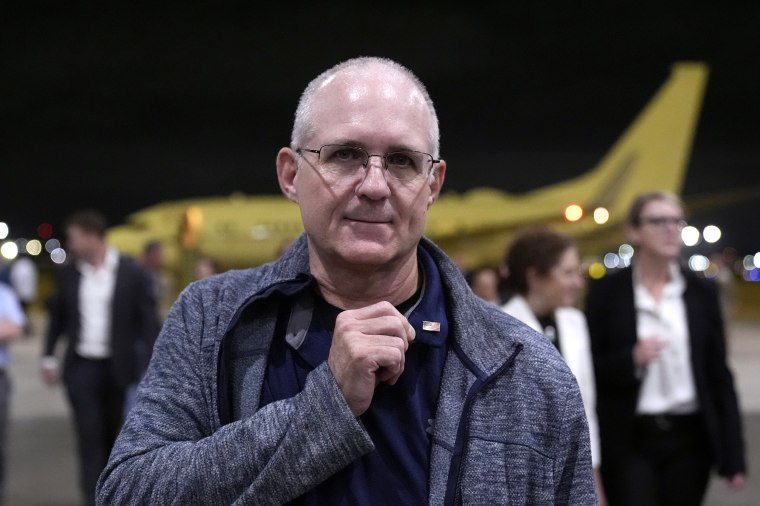
After greeting them, Biden directly addressed the Russian citizens released as part of the deal.
“They stood up for democracy and human rights, their own leaders threw them in prison. The United States helped secure their release as well,” he said.
Whelan, who was arrested in Russia in 2018 and held for more than five years, after being left out of two previous prisoner exchanges, called his return to the U.S. “a good homecoming.”
“Getting off the plane, seeing the president, the vice president, that was nice,” Whelan said. “Looking forward to seeing my family down here and recuperating from five years, seven months and five days of just absolute nonsense by the Russian government.”
He thanked his supporters, saying he received thousands of letters and cards, “so many that the FSB stopped giving them to me.”
Whelan, who was convicted of espionage and sentenced to 16 years in prison, called the Russian government’s charges against him a “nonsense narrative they came up with and they just, they wouldn’t let it go.”
“This is how Putin runs his government. This is how Putin runs his country,” he added.
“I’m glad I’m home,” he said. “I’m never going back there again.”
In Moscow‘s Vnukovo-2 Airport, an assassin, cybercriminals and others jailed for spying got stiff hugs and handshakes and a few words from President Vladimir Putin.
“I would like to thank you for the loyalty to your oath, your duty and your motherland, which has not forgotten you for even a minute,” he told them.
Putin also greeted a family of spies who posed as Argentinian citizens while living in Slovenia, before they were detained there. Artem and Anna Dultseva were sentenced in a closed trial at a court in the country’s capital, Ljubljana, on Wednesday after pleading guilty to spying charges.
The pair had posed as Ludwig Gisch and Maria Rosa Mayer Muños, and settled in Slovenia in 2017. Their two children attended an international school in Ljubljana, local media reported.
After describing the couple as “illegal intelligence officers,” Kremlin spokesman Dmitry Peskov said Friday that Putin spoke to the children in Spanish.
“When the children walked down the plane — they don’t speak Russian — and Putin just greeted them in Spanish. He said, ‘Buenas noches,’” Peskov said.
He added that they only found out they were Russian when they were on the plane taking them to Moscow.
“They asked their parents yesterday who this guy was meeting them. They didn’t even know who Putin was,” Peskov said.
For John Lough, an associate fellow at the London-based think tank Chatham House, the most important of the eight prisoners freed, for Putin, was Vadim Krasikov, a Russian hitman who was jailed for life in Germany for the killing of Zelimkhan Khangoshvili, a former Chechen separatist.
Germany alleged that Krasikov was acting on the Kremlin’s orders when he rode through Berlin’s central Tiergarten Park on a bicycle and gunned down Khangoshvili, 40, in broad daylight. Moscow denied its direct involvement in the killing, which caused a major diplomatic dispute between Russia and Germany.
“He clearly wanted Krasikov back and he had to pay a relatively high price for this. There seems to be a personal connection between the two of them,” Lough said.
While some analysts and observers suggested the prisoner exchange deal could signal that Putin was warming to the idea of negotiations to end the war in Ukraine, Lough said he didn’t think it was in “any way related to a potential truce or peace settlement.”
Putin, he added, “isn’t ready for negotiations. He believes he’s winning even if it’s taking longer than he would have liked. He’s in no hurry.”
,




